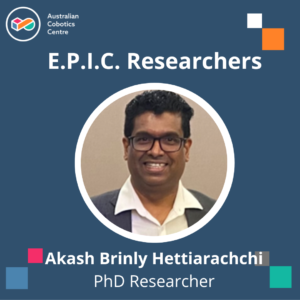POSTED: 18 Mar, 2024
 Akash Hettiarachchi is a PhD researcher based at Queensland University of Technology and his project is part of the Human-Robot Workforce Program at the Australian Cobotics Centre.
Akash Hettiarachchi is a PhD researcher based at Queensland University of Technology and his project is part of the Human-Robot Workforce Program at the Australian Cobotics Centre.
His current research interests include diversified work groups, the attraction of different social groups to the advance manufacturing sector and overcoming work force gaps.
We interviewed Akash recently to find out more about why he does what he does.
-
Tell us a bit about yourself and your research with the Centre?
I have worked in the manufacturing industry for almost 20 years, specializing as an HR Professional for major global manufacturing companies. Throughout my career, I have gained invaluable experience working with diverse workforces across different regions and cultures. This experience has not only provided me with practical insights but also enhanced my theoretical knowledge in the field. I have had the privilege of collaborating with industry experts and witnessing firsthand the advancements in technology within the manufacturing industry. This exposure has fueled my passion for research and equipped me with a deeper understanding of how to contribute effectively to the industry.
Moving forward, I believe it is essential to forge strong partnerships with industry leaders and gain a thorough understanding of the practical implications of workforce development alongside technological advancements. By combining this practical knowledge with my diverse background, I can contribute to the manufacturing industry by formulating innovative business strategies that provide a competitive edge.
-
Why did you decide to be a part of the Australian Cobotics Centre?
The Australian Cobotic Centre stands out from other research groups by actively engaging with the industry and directly investigating pressing issues in the manufacturing sector. It also serves as a platform for researchers with diverse backgrounds to collaborate and share their findings with a wider audience. Additionally, maintaining ongoing connections with technical and HR experts opens up new research opportunities and fosters improved collaboration.
-
What project are you most proud of throughout your career and why?
Promoting diversity in the workforce is a project that is extremely important to me. Throughout my professional career, I have unfortunately encountered discrimination in various areas, including recruitment, selection, promotions, and training and development. This discrimination has been especially prevalent among underrepresented groups. Additionally, I have observed firsthand how managers perpetuate unaccepted behaviour towards minority groups, highlighting the urgent need for support from business leaders.
-
What do you hope the long-term impact of your work will be?
I intend to work with manufacturing organizations as a consultant, offering guidance on effectively managing the new generations and other underrepresented groups in the context of Industry 4.0. I also aim to blend traditional HR strategies with technological support and leverage technology to develop more inclusive HR strategies. The HR community I am currently connected with is an excellent platform for sharing my research findings and exploring new opportunities to enhance global HR strategies.
-
Aside from your research, what topic could you give an hour-long presentation on with little to no preparation?
As an HR Practitioner, I am most comfortable presenting on manufacturing-related HR strategies, problems faced by women in the manufacturing sector, and the impact of technology on the workforce. These topics require minimal preparation on my part.
Recent News
Meet our E.P.I.C. Researcher, Zongyuan Zhang
Zongyuan Zhang is a PhD Researcher in the Biomimic Program and is currently researching the following problem: how to use robots with a non-rigidly ...
Exploring the Realities of Cobot Adoption in Manufacturing
We’re proud to celebrate the latest publication from our research team in Futures, a leading journal by Science Direct. Congratulations to PhD resea ...
Australian Cobotics Centre Researchers Present at AOA QORF 2025 Meeting
Last week, researchers from the Australian Cobotics Centre were proud to present their work at the Australian Orthopaedic Association (AOA) Queensland ...